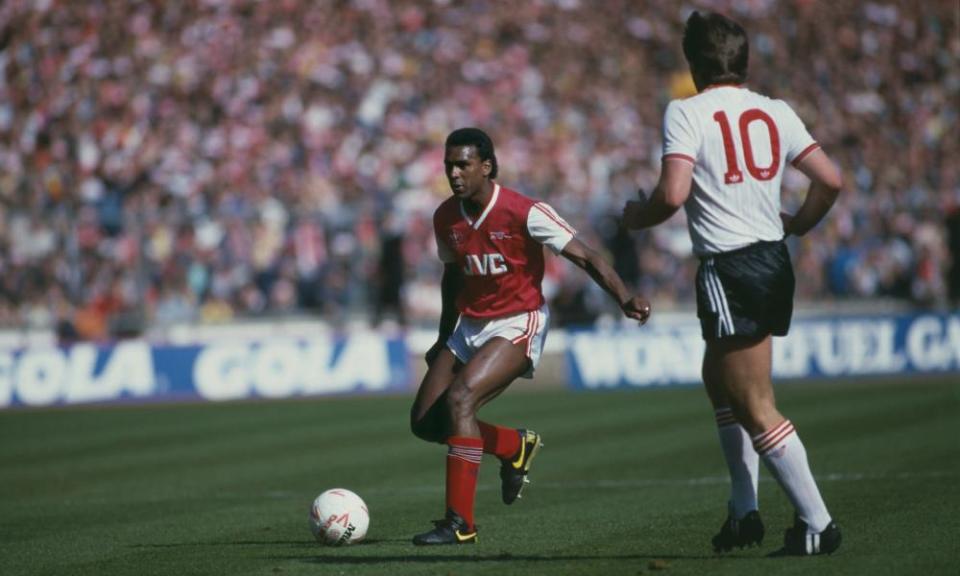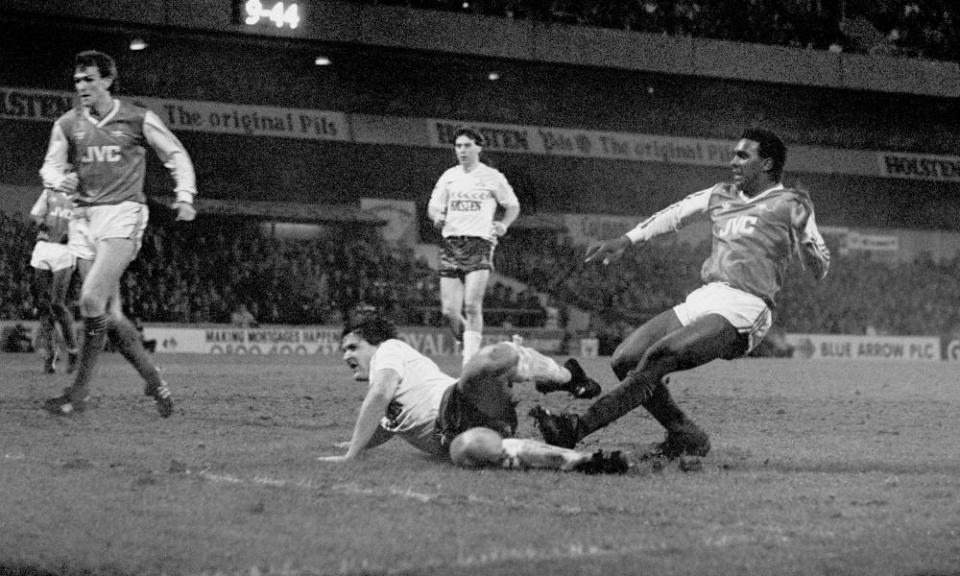Time to remember the remarkable David Rocastle | Daniel Taylor

It was something Paul Merson said during that raw television interview a couple of Fridays ago that lingers in the mind. You might not always agree with Merson’s football opinions but there are times when that does not really matter. Earlier that day, his former team-mate Ugo Ehiogu, the friend he described as a “man-mountain”, had died from a heart attack, aged 44, and now Merson was in a television studio when it would probably have been kinder to allow him some time alone and he was trying to make sense of it all. He couldn’t, but it was some tribute. “You know what,” he said, and he was struggling to get out the words. “Billy Joel sings that song Only The Good Die Young. And that is him.”
To be pedantic, that song was actually about something entirely different when it was recorded in 1977, prompting a number of religious groups to pressure various radio stations to remove it from their playlists. Yet we all knew what Merson meant, we all probably know others it could apply to and no doubt there will be plenty of people – Merson, again, included in that number – who will be thinking the same about David Rocastle in the next few days.
I mention Rocastle because if everything had turned out differently, if the cancer had not spread so devastatingly, it would have been his 50th birthday this coming Tuesday. Rocastle was dead at 33. It’s a brutal, indiscriminate disease and anyone who has seen a friend or relative in its final stages will probably understand why, in his last few months, the small group of people he allowed to see him found his appearance so shocking.
Those toned, muscular legs – “thighs like tree trunks”, Tony Adams once said – had become little more than skin and bone. The shiny black hair had fallen out. His cheeks were hollowed and his glasses suddenly seemed too big for his face, propped up on sharp cheekbones. There were scorch marks on his chest, a legacy of his chemotherapy and all the poison that had been pumped into his system in an attempt to curb the disease. It hadn’t worked but the people closest to Rocastle remember he always thought there would be another solution – a miracle, perhaps. “Rocky”, as he was commonly known, even turned away the Marie Curie nurses, convinced he was going to beat it.
At the end, his younger brother, Steve, was holding his hand. The last time their mother, Linda, had heard from her eldest son was a few days earlier when he rang to wish her happy Mother’s Day and, breathless, barely had the strength to complete his sentences. “I’ll be all right once I’ve had some sleep,” he assured her. “Love you.”
It was the following morning he started drifting in and out of consciousness and, after that, his condition rapidly went downhill. He died with an Arsenal shirt by his side, “Rocastle” emblazoned across the back, brought to him by David Dein, the club’s then vice-chairman.
Then, like now, there was a north London derby and perhaps this is an appropriate time to remember what happened at that game and remind ourselves that, however tribal this sport can feel sometimes, there is a level of decency, too, and occasions that unite people who otherwise give the impression they do not particularly like sharing each other’s oxygen.
On that afternoon at Highbury, just a few hours after the news had broken, there was enough concern about the Spurs fans disrupting the minute’s silence it was suggested to the referee, Paul Durkin, he should blow his whistle prematurely as soon as he heard anything untoward, to try to minimise the risk of trouble between the rival supporters.
As it was, the tribute went ahead without the faintest interruption for the man Michael Hart summed up in London’s Evening Standard as a “throwback to a bygone age, a young footballer who retained a charm and sense of perspective at a time when the egoists were about to take over the dressing rooms”.
What would Rocastle have been doing at 50? Coaching, if he got his way. Or at least that was the plan when he retired from playing with a knee injury at the age of 32. But there would have been other options. Rocastle was articulate enough and had the personality – his “knockout smile”, to quote Ken Bates, then the chairman at Chelsea – to suit television. His agent, Jerome Anderson, had floated the idea of him joining the business.
Yet Rocastle wanted to be out in the fresh air and Dein, for one, liked the idea of him returning to Arsenal and mentoring the youth team in the same way that now applies to Steven Gerrard at Liverpool. David O’Leary used to say that if football put together a team of nice guys Rocastle would be the captain. It wouldn’t have automatically made him an elite coach but it would have made him someone the young players respected and wanted to impress.
Instead, his world fell in when he decided it was time to get an expert opinion about the two lumps that had appeared in his armpit. It was non-Hodgkin lymphoma, the same aggressive form of cancer that claimed Gary Ablett 11 years later, and though Rocastle tried to keep some of the shattering details from his family the diagnosis was just another reminder about what a bastard of a disease we are talking about. It was terminal – all the chemotherapy could do, at best, was delay the inevitable. He left a wife, Janet, and three children, Melissa, Ryan and Monique,
The best tribute now is the fact that, 16 years since his death, Arsenal’s fans still sing his name and inevitably will do so again at White Hart Lane on Sunday. Rocastle’s career started to drift once he moved to Leeds in 1992, followed by transfers to Manchester City and Chelsea, at a time when they were very different clubs to today, as well as loan moves to Hull (likewise) and Norwich and even a brief period in Malaysia. But his years at Arsenal, featuring 14 England caps and two league titles, provided the highlights of his show reel. “I’ve seen the nearest thing to a Brazilian footballer you’ll ever see,” Dein once said, “and he’s from Lewisham.”

Rocastle came in at No16 in a vote to find the club’s 50 greatest players and it is no coincidence – and probably a compliment in some form – that Stuart Pearce once tackled him with enough enthusiasm that the man wearing Arsenal’s No7 shirt landed closer to the stand than the pitch. Opponents often tried to kick Rocastle because they knew he had the finesse to get past even the more accomplished defenders. Alan Hansen did it, too, one time. But here was the other thing about Rocastle: he could look after himself. He got back to his feet, smiled and looked his opponent in the eye. “Getting old, Alan?”
These days, the authorities are so jumpy about the possibility of minute’s silences being interrupted they generally ask for applause instead. That is a pity because when a silence is respected it can work beautifully and that day, 31 March 2001, shows the respect there was for Rocastle within the sport. Remember him this week – the smile, the thumbs-up, the chip over Peter Schmeichel – and why it is that all of us should want our footballers to be like him.
“Why is he so fondly remembered?” James Leighton, the author of Rocky, writes in his elegant biography. “Simply, he came across as a beautiful human being. Softly spoken, with a smile permanently etched across his face, he led many, myself included, to think of him as a friend. He was someone you knew you would get on well with. You knew he would be great company. You knew he would be loyal. You knew he would make you feel good about yourself. And isn’t that what heroes are meant to do?”
Mourinho moans look short-sighted
Why does José Mourinho persist with creating the impression that Chris Smalling and Phil Jones are somehow guilty of professional cowardice by not rushing back from injury sooner, against all medical opinion at Old Trafford, to spare him from having to play Daley Blind in Manchester United’s defence?
In the case of Jones, is it usual to expect a player to run off a broken bone in his foot? Smalling’s knee was in a brace as recently as last week, having jarred ligaments on England duty, and it feels wholly unfair that Mourinho has depicted them as lacking competitive courage.
Indeed, the opposite could be said of Jones, in particular – of all the questions about his suitability for a team with United’s ambitions, accusations of halfheartedness have never surfaced until now.
My suspicion is that Mourinho wants to harden the attitude of everyone at Old Trafford and when he says it was a “nice group” he inherited from Louis van Gaal it is not necessarily meant as a compliment.
A valid point? Very possibly, but there are ways of going about it. Luke Shaw, Anthony Martial and Henrikh Mkhitaryan have all had it in the neck during Mourinho’s press conferences this season and, though United’s 24-match unbeaten run in the league is a measure of his restorative powers, it is this kind of approach that demonstrates why his players tend to feel worn down and mutinous once he has been in position longer than two years.
Clough Jr working minor miracles
On one of the last occasions I saw Brian Clough in the flesh he had hijacked one of his son Nigel’s press conferences at Burton Albion and was berating him in front of the cameras for not being overly bothered about the idea of challenging himself at another club. “He’s shaping up to be a good manager but if there’s one weakness it’s that he’s too comfortable,” came the verdict from Old Big ’Ead. “Everyone tells me what a nice lad he is and I’m getting sick of it, to be honest.”
Well, Nigel took the advice, spending several years at Derby County and Sheffield United before returning to Burton, the club he led from the Southern League Premier Division, to inherit the side left by Jimmy Floyd Hasselbaink and winning promotion to the Championship last year with a team whose record transfer was £20,000, set in 2009 when they signed Russell Penn from Kidderminster Harriers.
Burton, under their shrewd chairman, Ben Robinson, have spent a bit more than that this season but still only a pittance compared with some of the teams in England’s second tier and they were the overwhelming favourites, with no argument from Clough himself, to finish in the relegation places. As it is, the team from the Pirelli Stadium, with its 6,912 capacity, have survived with something to spare, beating Derby, Nottingham Forest and Leeds United, among others.
Chris Hughton and Rafael Benítez might be the obvious choices when it comes to selecting the Championship’s manager of the year but perhaps the judges should look a little further down the table.

 Yahoo Sports
Yahoo Sports 